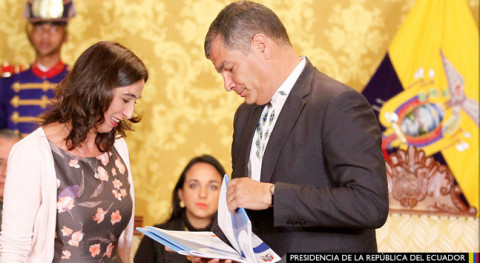Ideas into movement
Boost TNI's work
50 years. Hundreds of social struggles. Countless ideas turned into movement.
Support us as we celebrate our 50th anniversary in 2024.

On May 16, President Correa of Ecuador signed decrees terminating 16 Bilateral Investment Treaties (BITs), including with the US, Canada, China and eight European countries.

The decision follows the recommendation of the Ecuadorian Commission that audited the country's Investment Protection Treaties (CAITISA).
The President of the CAITISA Commission Cecilia Olivet (a researcher at the Transnational Institute) commented “Ecuador has taken a sound decision by terminating its investment protection agreements. The auditing process revealed that these treaties not only failed to attract additional investment or advance the country's development plan, they also diverted millions of dollars of government money to fighting costly lawsuits. We hope other governments will learn from Ecuador’s example and review their own investment agreements to find out if they are truly beneficial to their citizens.”
The 12-person CAITISA commission was set up in October 2013 and was comprised of government officials, academics, lawyers and civil society groups, including the foremost expert on investment law, Muthucumaraswamy Sornarajah and the former Attorney General for Argentina, Osvaldo Guglielmino.
Treaties were terminated with: China, the Netherlands, Germany, the UK, France, Spain, Italy, Sweden, Switzerland, Canada, the United States, Argentina, Bolivia, Peru, Venezuela, and Chile.
The decrees are available here (in Spanish). The key findings and recommendations from the CAITISA report are available here (in Spanish)
1.The Bilateral Investment Treaties (BITS) signed by Ecuador failed to deliver promised foreign direct investment:
Ecuador, which has more BITS than many countries in the region, only received 0.79% of global FDI that flowed to Latin America and the Caribbean
The principal sources of FDI flows into Ecuador are from Brazil, Mexico and Panama, none of whcih have a BIT with Ecuador
Of the 7 largest foreign investors in Ecuador, only 23% come from a country which has a BIT signed with Ecuador.
2. Ecuador’s BITs contradict and undermine the development objectives laid out in the the country’s constitution and its National Plan for Living Well (Buen Vivir). The Ecuadorian constitution of 2008 in its articles 3, 276, 277, 283, 284, 313-318, 339, 222 requires the state to regulate foreign investment to ensure it plays a positive role in achieving the country’s Living well Plan. However, BITS include clauses that erode these state competences.
3.While promises of investment and development have failed to materialise, the costs for Ecuador have been immense with investors disproportionately benefiting in cases against Ecuador:
Ecuador has faced 26 cases in international tribunals based on the Bilateral Investment Treaties
In 2014, Ecuador was fifth in the world in terms of investment protection arbitration cases; today it is in tenth place
In the 15 cases where the tribunal has made judgements on jurisdiction, the investor has been favoured in 13 cases (87%) and the state only twice.
4. A total of $21.2 billion dollars has been demanded as compensation from Ecuador by corporations for supposed violation of investment protection agreements.
5. The total amount disbursed so far by the state has been $1.498 billion dollars, equivalent to 62% of health spending.
6. Of the cases that are currently open, the State runs the risk of having to disburse 13.4 billion USD. This is equivalent to 52% of the General State Budget for 2017.
1- Termination of all bilateral investment treaties
2- Negotiation of new instruments between the State and Investors such as:
a) international investment contracts with restricted rights and investor’s obligations
b) Investment treaties based on an alternative investment model. The Commission has made the recommendation to:
3- Regarding the international investment arbitration system
4- Develop a comprehensive national policy and specific rules for foreign investment.
5- Consolidate the powers and the institutional governance of foreign investment in one agency